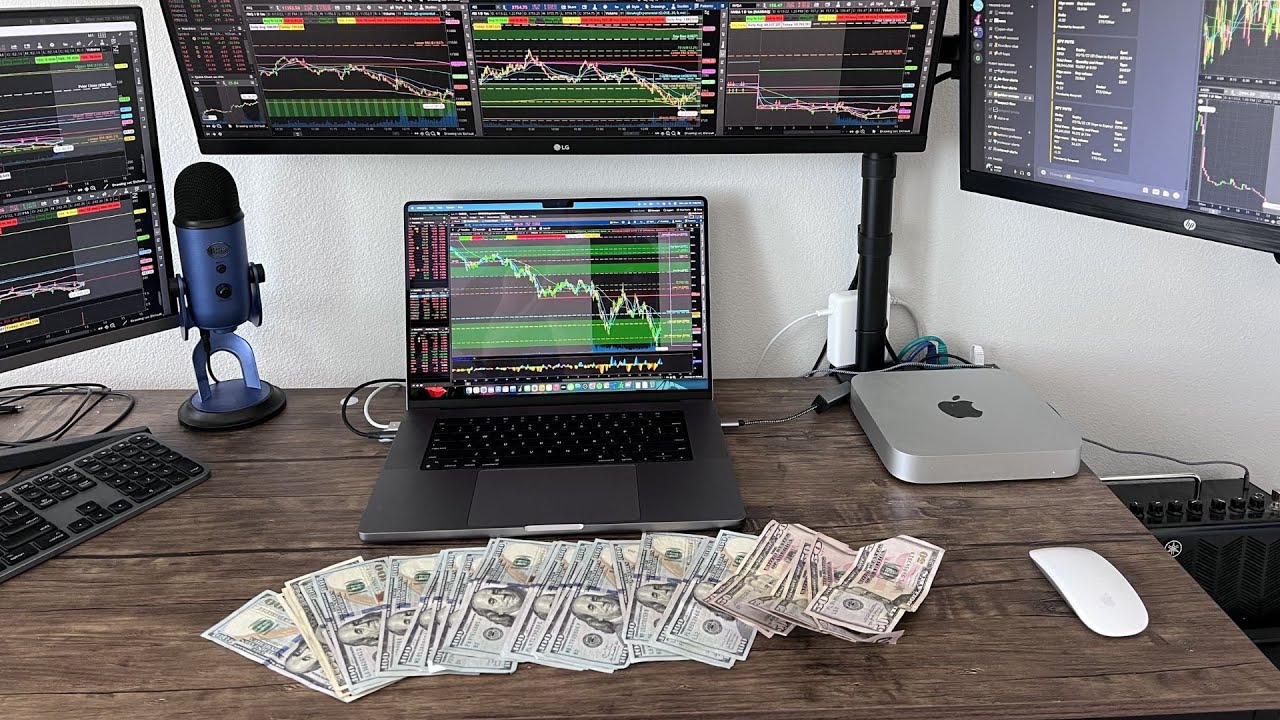How Many Futures Trading Days In A Year?
Curious how many futures trading days in a year? Find out the exact number and what it means for your trading calendar.

Futures trading offers numerous advantages, but achieving success comes with significant challenges. For example, without a solid trading plan, you may struggle to adapt to the fast-paced market fluctuations that occur throughout the trading day. With this in mind, it can be helpful to know precisely how many futures trading days occur annually, so you can plan your strategies effectively, optimize your trading routine, and improve your chances of success.
In this article, we’ll explore how many futures trading days are in a year and why this number can change from year to year. We’ll also investigate how you can leverage this knowledge to improve your futures trading strategy.
One tool that can help you achieve your trading goals is AquaFutures funded accounts for futures trading. These make it easy to determine the number of futures trading days in a year, allowing you to plan your strategies effectively.
How Many Futures Trading Days In A Year?

Futures trading typically aligns closely with the significant stock market calendars, resulting in about 252 trading days per year for most U.S.-based futures markets. This figure accounts for typical weekday trading, excluding holidays when exchanges are closed or have shortened sessions.
Extended Trading Hours Set Futures Apart
Unlike stock markets, futures markets offer nearly 24-hour trading on weekdays, generally opening Sunday evening and closing late Friday afternoon in U.S. time zones. This extensive trading window enables market participants to respond to global events more quickly and provides additional opportunities to enter or exit positions.
Exchange Differences and Holiday Schedules
Major futures exchanges, including CME Group, ICE, and Eurex, share similar trading day counts but may differ slightly in holiday observances and trading hours, depending on the asset classes. For instance, equity index futures may close early on certain holidays, while agricultural futures might be fully closed on the same days.
Common Holidays with Reduced or No Trading
Key holidays when futures markets are generally closed or have limited hours include New Year’s Day, Christmas Day, Thanksgiving, and major U.S. public holidays such as Martin Luther King Jr. Day, Presidents’ Day, and Labor Day. Exact trading hours and closures vary by exchange and contract type; therefore, traders should verify using the official exchange calendars.
Trading Year-Round with Prop Firm Support
Navigating the futures market’s extensive trading days can be challenging, especially when managing capital and trade execution across different sessions. This is where prop firms like AquaFutures come in, offering funded futures accounts that provide traders with the necessary capital to participate throughout the year while actively and effectively managing risks. Such support enables traders to maximize the nearly 252 trading days available in these markets.
Why Choose AquaFutures?
AquaFutures provides traders with fast and affordable access to funded futures accounts, featuring instant options, straightforward rules, and genuine payouts. Whether you're looking to skip evaluations or grow through performance-based scaling, our programs are designed to reward consistency without unnecessary restrictions.
Join thousands of traders who trust AquaFutures for transparent rules, fast support, and real capital. Ready to take the next step in your trading journey? Explore our account options and get funded today. Unlock up to 50% off your first funded account—plus surprise BOGO deals and bonuses updated weekly.
Related Reading
- How To Trade Futures Successfully
- What Are Futures In Trading
- What Is The Best Futures Trading Platform
- What Is A Point In Futures Trading
- How Much Can You Make Trading Futures
- Can You Trade Futures On TradingView
- How Much To Trade Futures
- When Is The Best Time To Trade Futures
- How Are Futures Similar To Options How Are They Different
- How Is Futures Trading Taxed
- Beginning Futures
- What Time Does Futures Market Open
- Automated Futures Trading
Futures Market Trading Hours

Trading Hours for Futures Markets
Futures markets typically open for trading each week on Sunday at 5:00 p.m. Central Time (CT) and close on the following Friday at 4:00 p.m. CT. Trading is paused for a 60-minute break daily from 4:00 p.m. to 5:00 p.m. CT, during which contracts undergo a marking-to-market (MTM) process. This procedure updates margin requirements and the current profit or loss position of each trader.
CFE Products Trading Hours
The Chicago Futures Exchange (CFE), operated by the Chicago Board Options Exchange (Cboe), offers futures primarily on volatility and corporate bond indexes. Its central contracts are the Cboe Volatility Index (VIX) futures (/VX) and Mini-VIX futures (/VXM). These futures reflect the expected volatility of the S&P 500 over the next 30 days.
Trading hours on CFE align with the general futures schedule, from Sunday at 5:00 p.m. to Friday at 4:00 p.m. CT, with a daily 60-minute break.
Equities and Interest Rate Futures Trading Hours
Equity futures track major stock indices, including:
- E-Mini S&P 500 futures (/ES)
- E-Mini Nasdaq-100 futures (/NQ)
- E-Mini Russell 2000 futures (/RTY)
- Micro-sized versions such as Micro E-mini S&P 500 (/MES)
Interest rate futures cover U.S. government bonds and notes, like the 10-year Treasury Note (/ZN) and 3-Month Secured Overnight Financing Rate (/SR3). Both equity and interest rate futures trade on the Chicago Mercantile Exchange (CME) from Sunday 5:00 p.m. to Friday 4:00 p.m. CT, including the daily hour-long break.
Cryptocurrency and Forex Futures Trading Hours
CME offers futures on cryptocurrencies such as Bitcoin (/BTC), Ether (/ETH), and their micro versions like Micro Bitcoin (/MBT) and Micro Ether (/MET). Currency futures on major world currencies, such as the Australian Dollar (/6A), British Pound (/6B), and Euro (/6E), are also available. Micro contracts are generally available, except for the Japanese Yen and Mexican Peso.
Trading hours are consistent with the broader CME schedule: Sunday 5:00 p.m. to Friday 4:00 p.m. CT, with the daily 60-minute downtime. Notably, overnight margin requirements for Bitcoin futures can be higher than the CME's standard maintenance margin.
Energy and Metals Futures Trading Hours
Metals futures include Gold (/GC), Silver (/SI), and Copper (/HG) along with micro versions; energy futures comprise Crude Oil (/CL), Natural Gas (/NG), and fuel products like RBOB Gasoline (/RB) and Heating Oil (/HO). All these products trade on the CME with hours from Sunday at 5:00 p.m. to Friday at 4:00 p.m. CT, interrupted daily by a 60-minute break.
Agricultural and Livestock Futures Trading Hours
Agricultural futures on the CME cover commodities such as Corn (/ZC), Soybeans (/ZS), and Wheat (/ZW), including mini contracts. Their trading hours are somewhat different, running from Sunday 7:00 p.m. to Friday 1:20 p.m. CT, with a morning break between 7:45 a.m. and 8:30 a.m. CT.
Livestock futures like Lean Hog (/HE) and Live Cattle (/LE) trade Monday through Friday from 8:30 a.m. to 1:05 p.m. CT.
This structured timetable ensures traders have nearly continuous access to futures markets across various asset classes while maintaining regular daily breaks for administrative processes and contract mark-to-market settlements. The precise hours and breaks can vary slightly depending on the exchange and product category, but generally adhere to these central timeframes.
Related Reading
- Futures Trading Example
- Futures Trading Algorithms
- Stocks Vs Futures
- Futures Backtesting
- How To Buy Copper Futures
- Practice Futures Trading
- Futures Swing Trading
- Futures Prop Firms
- Automated Futures Trading Strategies
- Most Volatile Futures
Futures Holiday Schedule

Futures markets observe a specific schedule of holidays throughout the calendar year, during which trading is paused. These holidays typically align with major U.S. federal holidays and established stock market closures. This schedule ensures that traders and investors are aware of the days when futures trading is unavailable.
Annual Market Closures
The futures market shuts down on several key holidays throughout the calendar year, including:
- New Year’s Day
- Martin Luther King Jr. Day
- Presidents’ Day
- Good Friday
- Memorial Day
- Juneteenth National Independence Day
- Independence Day
- Labor Day
- Thanksgiving Day
- Christmas Day
These closures provide uniformity and consistency with the broader U.S. equity and options markets.
Holiday Observance
When any of these holidays fall on a weekend, the market typically observes the closure on the nearest weekday, either the preceding Friday or the following Monday. This adjustment aligns with standard market practices and ensures minimal disruption to trading schedules.
Early Closures and Special Notes
On certain occasions, the futures market may have early closing hours, typically at 1:00 p.m. ET, for example, the day before Independence Day, the day after Thanksgiving, and Christmas Eve. These shortened sessions allow participants to prepare for the holiday while still providing some trading opportunities.
Trading Hours Reference
Regular trading hours for futures align with the schedules established by major exchanges such as CME Group and Nasdaq. However, holiday schedules may slightly vary and are subject to change based on input from regulatory bodies and exchanges. Traders should verify holiday hours near each event, as notifications are issued in advance.
Holiday Impact on Global Trading Days

Market holidays around the world have a significant impact on global trading dynamics, affecting liquidity, volatility, and trading opportunities. Understanding these effects is crucial for traders aiming to navigate the complexities of international markets.
1. Reduced Liquidity and Increased Volatility
Holiday periods significantly impact market dynamics. As the financial world prepares for an upcoming holiday, many traders and investors step away, leading to diminished market participation. This reduction in liquidity makes it more difficult to execute large trades without affecting prices, often resulting in wider bid-ask spreads. Markets may become more volatile, characterized by erratic price swings, or experience consolidation, where price movements slow and fluctuate within narrow ranges.
2. Market Gaps and Price Discontinuities
Another consequence of holiday closures is the emergence of market gaps. Price discontinuities can occur between the close of a trading session before the holiday and the reopening session, potentially triggering sudden and unpredictable price moves. These gaps represent both risks and opportunities for traders, particularly those utilizing futures and index trading strategies.
3. Cross-Market Arbitrage Opportunities
Due to the variation in holiday schedules across countries, some exchanges remain open while others close. This discrepancy opens arbitrage possibilities where traders can exploit price differences resulting from asynchronous trading days. Global futures traders, in particular, benefit from a deep understanding of these international calendar variations.
Specific U.S. Market Holiday Effects
U.S. financial markets observe both fixed-date holidays (such as Christmas and Independence Day) and floating holidays (like Memorial Day and Labor Day), with Good Friday notably closing markets despite not being a federal holiday. Additionally, early market closures are common on trading days preceding major holidays, typically at 1:00 PM Eastern Time on days like Thanksgiving Friday, Christmas Eve, and New Year’s Eve.
Varying International Holidays and Their Influence
Internationally, market holidays reflect cultural and religious observances, such as Chinese New Year, Diwali, Ramadan, and Golden Week. These cause significant trading disruptions locally while often generating opportunities in unaffected markets.
For example, while Asian markets may pause for Chinese New Year, European or U.S. markets may remain active, allowing for strategic positioning. European financial centers benefit from some coordination through the TARGET2 system, which partially harmonizes holidays among major centers; however, country-specific holidays still result in localized market closures and impact liquidity during their observance.
Pre- and Post-Holiday Trading Effects
Studies show distinct pre-holiday and post-holiday effects on returns across regions. For instance, Asian and North American markets often experience markedly higher returns in pre-holiday sessions, while European markets show increased returns after holidays. These effects are statistically significant, independent of other calendar anomalies, and represent exploitable patterns for informed traders.
Best Practices for Trading Around Holidays
Given the distinct risks, including lower liquidity, wider spreads, and increased volatility, traders are advised to adopt rigorous risk management strategies during holiday seasons. Some may choose to reduce trading activity or take time off, while others plan trades carefully around these periods to capitalize on unique opportunities presented by market behaviors during holidays.
Unlock up to 50% off Your First Funded Account for Futures Trading

AquaFutures provides traders with fast and affordable access to funded futures accounts, featuring instant options, straightforward rules, and genuine payouts. Whether you're looking to skip evaluations or grow through performance-based scaling, our programs are designed to reward consistency without unnecessary restrictions.
Join thousands of traders who trust AquaFutures for transparent rules, fast support, and real capital. Ready to take the next step in your trading journey? Explore our account options and get funded today. Unlock up to 50% off your first funded account—plus surprise BOGO deals and bonuses updated weekly.
Related Reading
- Where To Trade Futures
- How To Trade In Currency Futures
- How To Trade Futures With A Small Account
- Best Futures To Trade At Night
- Best Futures Prop Firms
- Best Automated Futures Trading System
- Futures Trading Tools
- Futures Swing Trading Prop Firm
- Best Brokers For Futures Trading
.png)





